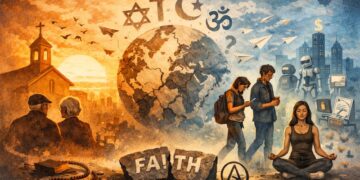By: Hilal Ahmad Tantray
Black magic, often known as witchcraft, is the practice of employing supernatural powers for the aim of producing negative and self-serving results, such as causing harm to the physical, mental, or financial well-being of another individual. Throughout the course of history, this particular form of magic has been tied to demonic entities and has been traditionally associated with bad intentions.
‘Sihr’ in Arabic, witchcraft refers to a wide range of practices, beliefs, and bodies of knowledge. For thousands of years, people all across the world have acknowledged magic, also called sorcery. Many cultures have long held witches in high regard, seeing them as divine messengers, sages, and priests. India has a long history of these traditions too and is often portrayed as a nation of magical practices, both paranormal and ordinary.
In Surah Al-Baqarah, verse 102, the holy Quran talks about witchcraft. People pray to God through Surah Al-Falaq to keep them safe from black magic. Sacred texts such as the Vedas in Hinduism address both white and black sorcery. Rajatarangini by Kalhana accounts for the use of black magic by monarchs and ministers in early medieval India, including uccatana (overthrowing an enemy) and marana (causing death).
The Atharva Veda comprises mantras that can be utilized for both beneficial and harmful intentions. The term “mantrik” in India denotes a ‘magician,’ specifically individuals who utilize spells and curses. Buddhist monks in Tibet execute traditional dances that represent ancient malevolent spirits, highlighting the enduring essence of these beliefs.
According to famous sociologist Emile Durkheim, magic is regarded as immoral and anti-social. Edward Burnett Tylor and James George Frazer characterize magic as superstition, an early evolutionary stage of science that is frequently inadequate and deceptive.
In India, there is evidence of witchcraft dating back to ancient times, and the town of Mayong in the state of Assam is considered to be the capital of black magic. The historical records reveal that even medieval invaders from the west were afraid of the power of sorcery. For example, in the year 1337, Mohammed Shah, the Governor of Bengal, sent an army to Assam, only for it to disappear without a trace, which led to a second attempt that was unsuccessful.
At present, the practice of witchcraft has its roots deep in our society. Despite education, individuals in Kashmir are turning to these practices out of jealously, greed, ill-will or disagreements. Several different social circles, including families, are impacted by this phenomenon, which ultimately results in disputes in which individuals cause harm to one another. The concealed nature of witchcraft has been brought to light by umpteen videos that have been shared on social media platforms.
The fact that some people continue to engage in these heinous behaviors, seemingly oblivious to the profound repercussions, is a source of great sorrow. Are they oblivious to the seriousness of their deeds, especially when taking into consideration the implications of divine retribution? Many lives have been ruined by witchcraft, which has resulted in major emotional suffering and financial loss. Nonetheless, individuals who have been influenced by it frequently continue to be held captive by its influence.
In our Kashmir called Resh Vaer, this evil practice continues to cast a sinister spell, shattering lives and destroying families. Mostly women are seen going to these so called self-styled Peers and falsely bring Taweez (amulets) from them against those who they are jealous of. Lack of education among people exacerbates the issue of sorcery, and force to endure unimaginable suffering. The cries of the innocent echo through the Valley, as superstition and ignorance fuel this heinous crime. Amidst the region’s spiritual beauty, the scourge of witch-hunting festers, exploiting fear and mistrust. It’s a stark reminder that even in abode of saints, darkness has descended, and humanity’s greatest challenge lies in vanquishing the shadows that shroud the truth.
Besides seeking divine protection, let’s wake up and restrain ourselves from this new social menace of witchcraft. I urge religious scholars like Imams, Khateebs, etc. to kindly dole their Friday sermons on ‘Sihr’ till people get enlightened and restrain harming others.
The writer is a Research Scholar, Department of History and Culture, Jamia Millia Islamia, New Delhi
hilalmohiuddin614@gmail.com



